Tor Lattimore
Contextual Information-Directed Sampling
May 22, 2022
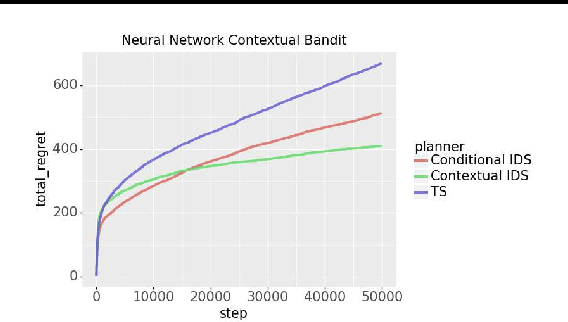

Abstract:Information-directed sampling (IDS) has recently demonstrated its potential as a data-efficient reinforcement learning algorithm. However, it is still unclear what is the right form of information ratio to optimize when contextual information is available. We investigate the IDS design through two contextual bandit problems: contextual bandits with graph feedback and sparse linear contextual bandits. We provably demonstrate the advantage of contextual IDS over conditional IDS and emphasize the importance of considering the context distribution. The main message is that an intelligent agent should invest more on the actions that are beneficial for the future unseen contexts while the conditional IDS can be myopic. We further propose a computationally-efficient version of contextual IDS based on Actor-Critic and evaluate it empirically on a neural network contextual bandit.
Minimax Regret for Partial Monitoring: Infinite Outcomes and Rustichini's Regret
Feb 22, 2022Abstract:We show that a version of the generalised information ratio of Lattimore and Gyorgy (2020) determines the asymptotic minimax regret for all finite-action partial monitoring games provided that (a) the standard definition of regret is used but the latent space where the adversary plays is potentially infinite; or (b) the regret introduced by Rustichini (1999) is used and the latent space is finite. Our results are complemented by a number of examples. For any $p \in [1/2,1]$ there exists an infinite partial monitoring game for which the minimax regret over $n$ rounds is $n^p$ up to subpolynomial factors and there exist finite games for which the minimax Rustichini regret is $n^{4/7}$ up to subpolynomial factors.
Variational Bayesian Optimistic Sampling
Oct 29, 2021
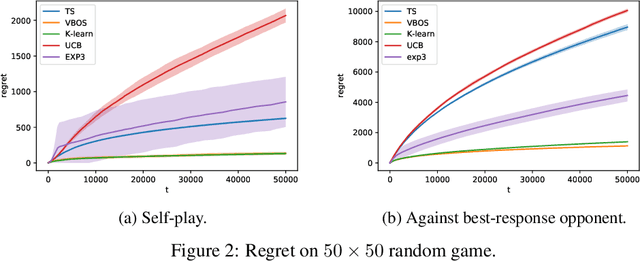

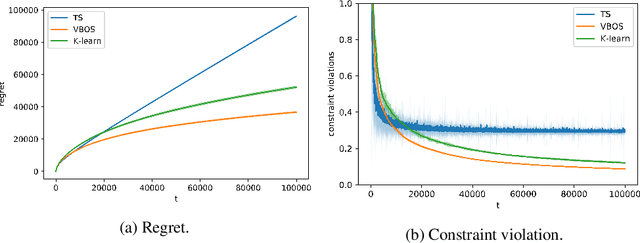
Abstract:We consider online sequential decision problems where an agent must balance exploration and exploitation. We derive a set of Bayesian `optimistic' policies which, in the stochastic multi-armed bandit case, includes the Thompson sampling policy. We provide a new analysis showing that any algorithm producing policies in the optimistic set enjoys $\tilde O(\sqrt{AT})$ Bayesian regret for a problem with $A$ actions after $T$ rounds. We extend the regret analysis for optimistic policies to bilinear saddle-point problems which include zero-sum matrix games and constrained bandits as special cases. In this case we show that Thompson sampling can produce policies outside of the optimistic set and suffer linear regret in some instances. Finding a policy inside the optimistic set amounts to solving a convex optimization problem and we call the resulting algorithm `variational Bayesian optimistic sampling' (VBOS). The procedure works for any posteriors, \ie, it does not require the posterior to have any special properties, such as log-concavity, unimodality, or smoothness. The variational view of the problem has many useful properties, including the ability to tune the exploration-exploitation tradeoff, add regularization, incorporate constraints, and linearly parameterize the policy.
Minimax Regret for Bandit Convex Optimisation of Ridge Functions
Jun 06, 2021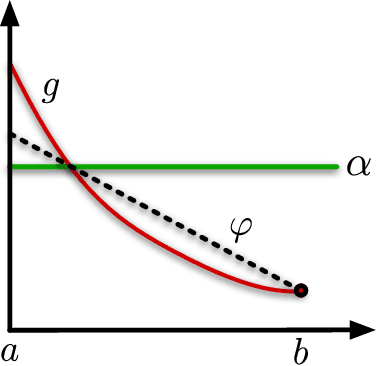
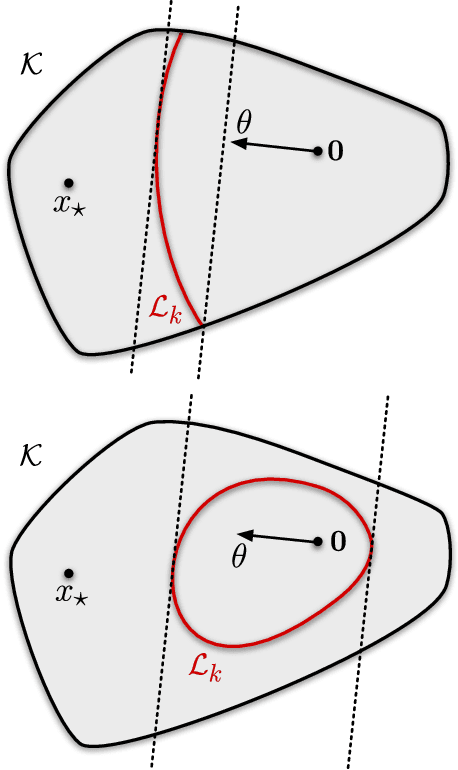
Abstract:We analyse adversarial bandit convex optimisation with an adversary that is restricted to playing functions of the form $f_t(x) = g_t(\langle x, \theta\rangle)$ for convex $g_t : \mathbb R \to \mathbb R$ and unknown $\theta \in \mathbb R^d$ that is homogeneous over time. We provide a short information-theoretic proof that the minimax regret is at most $O(d \sqrt{n} \log(n \operatorname{diam}(\mathcal K)))$ where $n$ is the number of interactions, $d$ the dimension and $\operatorname{diam}(\mathcal K)$ is the diameter of the constraint set.
Bandit Phase Retrieval
Jun 04, 2021
Abstract:We study a bandit version of phase retrieval where the learner chooses actions $(A_t)_{t=1}^n$ in the $d$-dimensional unit ball and the expected reward is $\langle A_t, \theta_\star\rangle^2$ where $\theta_\star \in \mathbb R^d$ is an unknown parameter vector. We prove that the minimax cumulative regret in this problem is $\smash{\tilde \Theta(d \sqrt{n})}$, which improves on the best known bounds by a factor of $\smash{\sqrt{d}}$. We also show that the minimax simple regret is $\smash{\tilde \Theta(d / \sqrt{n})}$ and that this is only achievable by an adaptive algorithm. Our analysis shows that an apparently convincing heuristic for guessing lower bounds can be misleading and that uniform bounds on the information ratio for information-directed sampling are not sufficient for optimal regret.
Information Directed Sampling for Sparse Linear Bandits
May 29, 2021


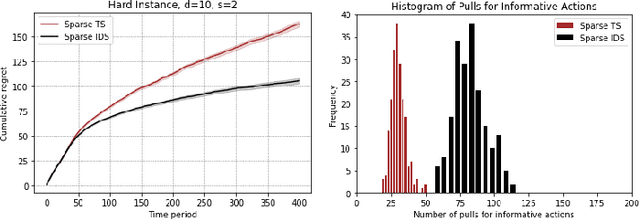
Abstract:Stochastic sparse linear bandits offer a practical model for high-dimensional online decision-making problems and have a rich information-regret structure. In this work we explore the use of information-directed sampling (IDS), which naturally balances the information-regret trade-off. We develop a class of information-theoretic Bayesian regret bounds that nearly match existing lower bounds on a variety of problem instances, demonstrating the adaptivity of IDS. To efficiently implement sparse IDS, we propose an empirical Bayesian approach for sparse posterior sampling using a spike-and-slab Gaussian-Laplace prior. Numerical results demonstrate significant regret reductions by sparse IDS relative to several baselines.
On the Optimality of Batch Policy Optimization Algorithms
Apr 06, 2021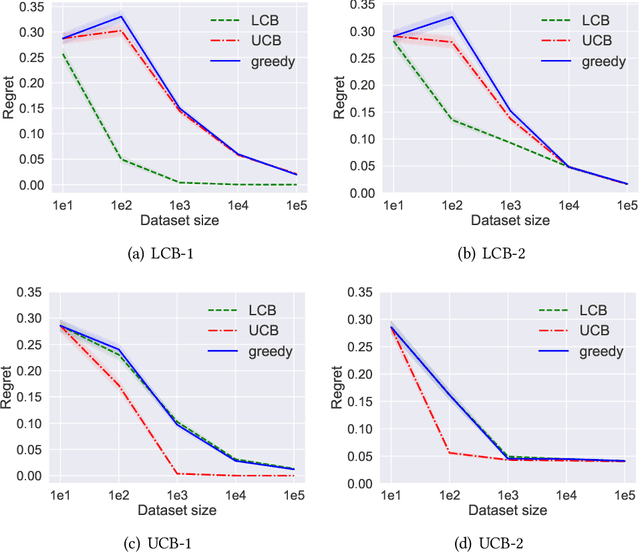
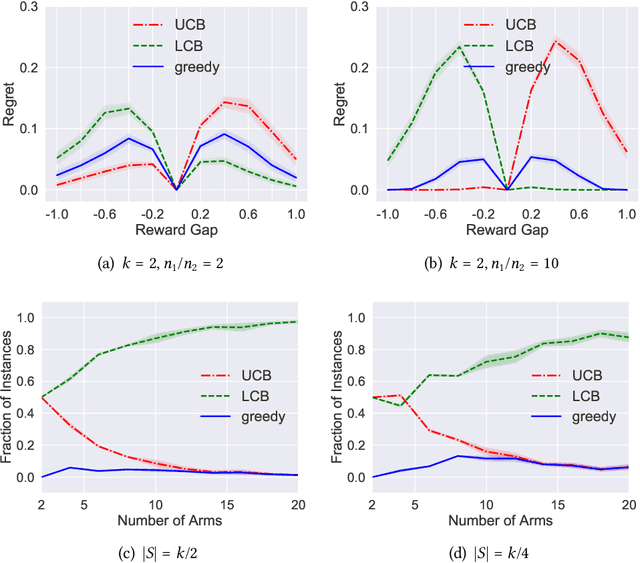
Abstract:Batch policy optimization considers leveraging existing data for policy construction before interacting with an environment. Although interest in this problem has grown significantly in recent years, its theoretical foundations remain under-developed. To advance the understanding of this problem, we provide three results that characterize the limits and possibilities of batch policy optimization in the finite-armed stochastic bandit setting. First, we introduce a class of confidence-adjusted index algorithms that unifies optimistic and pessimistic principles in a common framework, which enables a general analysis. For this family, we show that any confidence-adjusted index algorithm is minimax optimal, whether it be optimistic, pessimistic or neutral. Our analysis reveals that instance-dependent optimality, commonly used to establish optimality of on-line stochastic bandit algorithms, cannot be achieved by any algorithm in the batch setting. In particular, for any algorithm that performs optimally in some environment, there exists another environment where the same algorithm suffers arbitrarily larger regret. Therefore, to establish a framework for distinguishing algorithms, we introduce a new weighted-minimax criterion that considers the inherent difficulty of optimal value prediction. We demonstrate how this criterion can be used to justify commonly used pessimistic principles for batch policy optimization.
Geometric Entropic Exploration
Jan 07, 2021
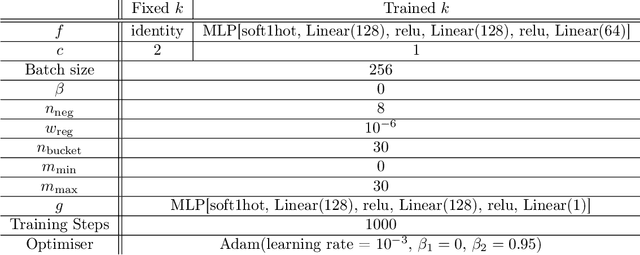
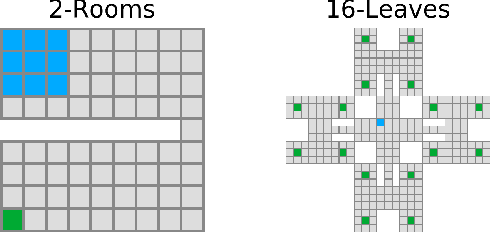
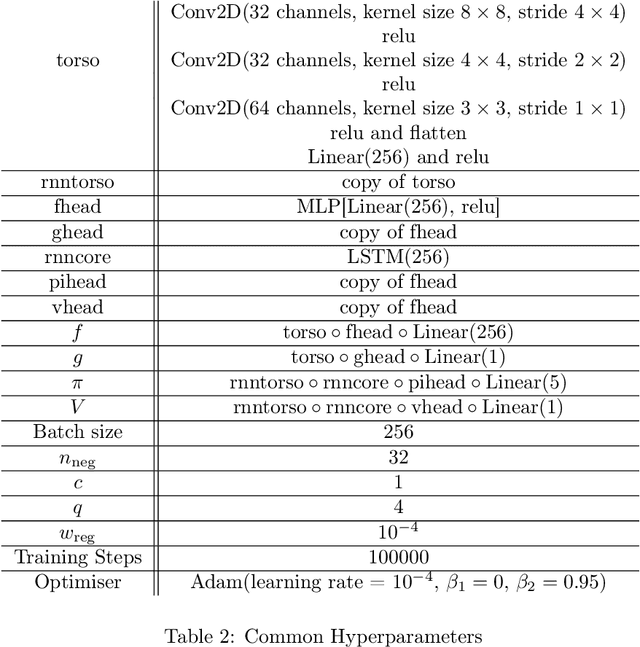
Abstract:Exploration is essential for solving complex Reinforcement Learning (RL) tasks. Maximum State-Visitation Entropy (MSVE) formulates the exploration problem as a well-defined policy optimization problem whose solution aims at visiting all states as uniformly as possible. This is in contrast to standard uncertainty-based approaches where exploration is transient and eventually vanishes. However, existing approaches to MSVE are theoretically justified only for discrete state-spaces as they are oblivious to the geometry of continuous domains. We address this challenge by introducing Geometric Entropy Maximisation (GEM), a new algorithm that maximises the geometry-aware Shannon entropy of state-visits in both discrete and continuous domains. Our key theoretical contribution is casting geometry-aware MSVE exploration as a tractable problem of optimising a simple and novel noise-contrastive objective function. In our experiments, we show the efficiency of GEM in solving several RL problems with sparse rewards, compared against other deep RL exploration approaches.
Asymptotically Optimal Information-Directed Sampling
Nov 11, 2020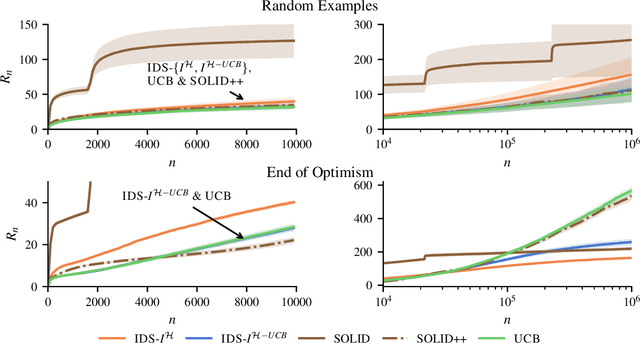
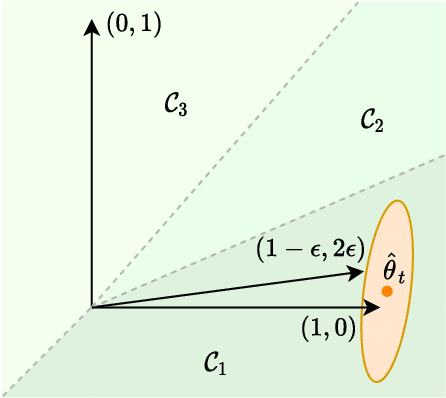
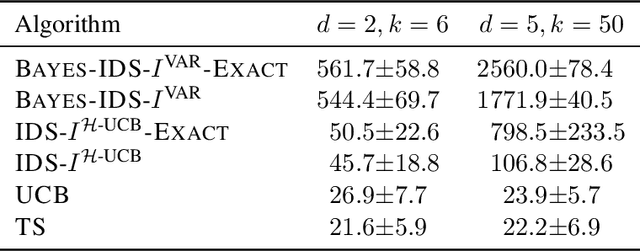

Abstract:We introduce a computationally efficient algorithm for finite stochastic linear bandits. The approach is based on the frequentist information-directed sampling (IDS) framework, with an information gain potential that is derived directly from the asymptotic regret lower bound. We establish frequentist regret bounds, which show that the proposed algorithm is both asymptotically optimal and worst-case rate optimal in finite time. Our analysis sheds light on how IDS trades off regret and information to incrementally solve the semi-infinite concave program that defines the optimal asymptotic regret. Along the way, we uncover interesting connections towards a recently proposed two-player game approach and the Bayesian IDS algorithm.
High-Dimensional Sparse Linear Bandits
Nov 08, 2020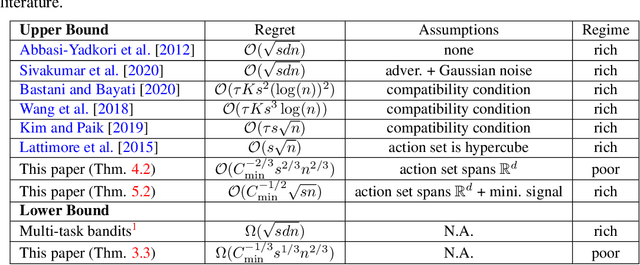
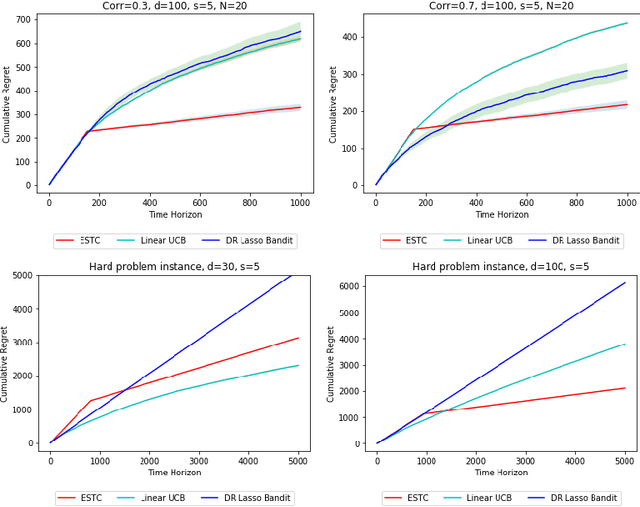
Abstract:Stochastic linear bandits with high-dimensional sparse features are a practical model for a variety of domains, including personalized medicine and online advertising. We derive a novel $\Omega(n^{2/3})$ dimension-free minimax regret lower bound for sparse linear bandits in the data-poor regime where the horizon is smaller than the ambient dimension and where the feature vectors admit a well-conditioned exploration distribution. This is complemented by a nearly matching upper bound for an explore-then-commit algorithm showing that that $\Theta(n^{2/3})$ is the optimal rate in the data-poor regime. The results complement existing bounds for the data-rich regime and provide another example where carefully balancing the trade-off between information and regret is necessary. Finally, we prove a dimension-free $O(\sqrt{n})$ regret upper bound under an additional assumption on the magnitude of the signal for relevant features.
 Add to Chrome
Add to Chrome Add to Firefox
Add to Firefox Add to Edge
Add to Edge